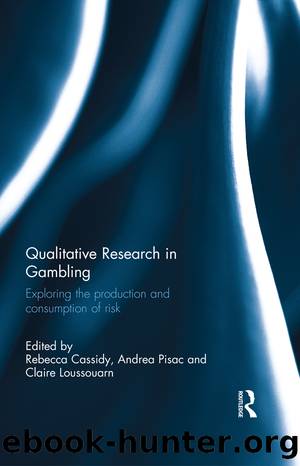Qualitative Research in Gambling by Rebecca Cassidy Andrea Pisac Claire Loussouarn

Author:Rebecca Cassidy, Andrea Pisac, Claire Loussouarn [Rebecca Cassidy, Andrea Pisac, Claire Loussouarn]
Language: eng
Format: epub
Tags: Nonfiction, Social & Cultural Studies, Social Science, Anthropology, Sociology, Sports
ISBN: 9781134445929
Publisher: Taylor and Francis
Published: 2013-10-30T04:00:00+00:00
Whilst blackjack is a game of chance and depends on the turn of the cards, it is also a game where probability is very important, and numerous blackjack websites publish tables showing the odds on particular sequences of cards appearing. These odds can vary, depending, for example, on how many decks are in the shoe, and whether shuffling is done manually or mechanically.6 The tactics employed by blackjack players in Cyprus reflect their view that odds are stacked in the favour of the casino, but not overwhelmingly so. The rule of thumb suggested to me was that the casino will win 52 per cent of the time â but players can win 48 per cent of the time. Thus the flow of cards presents the blackjack player with opportunities to come out ahead of the casino by increasing their stake when they hit a winning streak â that is, when the cards are coming out right. The player has to be able to âread the tableâ, to understand when the time is right to bet more aggressively; to âdouble downâ (doubling the bet when the first two cards add up to 10 or 11 â the player is then restricted to taking only one more card, on which the whole outcome of the bet then depends, but is quite likely to draw a 10, making 20 or an unassailable 21); or to âsplitâ (creating two hands out of one when the first two dealt cards are of equal value).
Everybody at the blackjack table is part of a flow of probability represented in the sequence of cards;7 reading the flow of probability, anticipating what will come up next and making the âright decisionâ to turn the flow in the favour of the player requires a mixture of intuition logic and luck â and for this reason many people like blackjack, because they believe that, out of all the casino games, it allows the player to exercise their agency to influence the outcome.8 Some attempt to count the cards. Some players have unshakeable rules: high cards follow high cards; low cards follow low cards; never call for a card on 12 if the dealer has 6 or less. But there are always grey areas, where the âcorrectâ call is not clear; and there is always that element of luck and uncertainty â a player can make all the ârightâ decisions and the right calls; can have split, or doubled down, and have hundreds of euros riding on hands of 20; and against all the odds, the dealer can make 21. This often makes gamblers angry â the dealer âshould not winâ in those circumstances, and in such cases it is common to find players throwing up their hands in disbelief and announcing to the dealer, in an accusatory way: âYou are very bloody lucky!â (authorâs translation).
According to the lessons I absorbed whilst playing blackjack in Cyprus, difficult decisions start from around 12. If I have cards to the value of 12 and draw 10 with my next card, I will go bust.
Download
This site does not store any files on its server. We only index and link to content provided by other sites. Please contact the content providers to delete copyright contents if any and email us, we'll remove relevant links or contents immediately.
Cecilia; Or, Memoirs of an Heiress — Volume 1 by Fanny Burney(32547)
Cecilia; Or, Memoirs of an Heiress — Volume 2 by Fanny Burney(31945)
Cecilia; Or, Memoirs of an Heiress — Volume 3 by Fanny Burney(31931)
The Great Music City by Andrea Baker(31917)
We're Going to Need More Wine by Gabrielle Union(19034)
All the Missing Girls by Megan Miranda(15958)
Pimp by Iceberg Slim(14488)
Bombshells: Glamour Girls of a Lifetime by Sullivan Steve(14057)
For the Love of Europe by Rick Steves(13912)
Talking to Strangers by Malcolm Gladwell(13349)
Norse Mythology by Gaiman Neil(13348)
Fifty Shades Freed by E L James(13232)
Mindhunter: Inside the FBI's Elite Serial Crime Unit by John E. Douglas & Mark Olshaker(9324)
Crazy Rich Asians by Kevin Kwan(9277)
The Lost Art of Listening by Michael P. Nichols(7494)
Enlightenment Now: The Case for Reason, Science, Humanism, and Progress by Steven Pinker(7306)
The Four Agreements by Don Miguel Ruiz(6744)
Bad Blood by John Carreyrou(6611)
Weapons of Math Destruction by Cathy O'Neil(6265)
